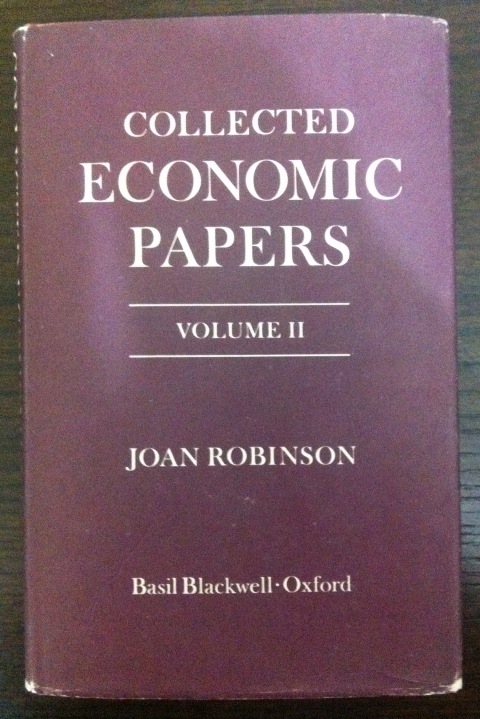I managed to get hold of Joan Robinson’s article Marx, Marshall And Keynes, published by the Delhi School of Economics as Occasional Paper No. 9 in 1955 based on lectures given by her at the School and republished in her Collected Economic Papers, Volume II.
It is an interesting essay on economists in general via analysing the ideas of Marx, Marshall and Keynes. So here are some gems.
From Introduction (page iv):
… Analysis dealing with actual events encounters the difficulty that the answers to economic problems are only political questions. With politics, enters ideological prejudice. As Gunnar Myrdal has pointed out, the very choice of questions to discuss is an expression of ideology; yet I believe that economic analysis, though it cannot help containing an element of propaganda, yet can be scientific as well. This question is discussed in the first paper, ‘Marx, Marshall and Keynes’.
I have always aimed to make my own prejudices sufficiently obvious to allow a reader, while studying the argument, to discount them as he thinks fit, though of course, this generally leads a reader of opposite prejudices to reject the argument in advance …
From the main essay (pages 3-5):
… Economic doctrines always come to us propaganda. This is bound up with the very nature of the subject and to pretend that it is not so in the name of ‘pure science’ is a very unscientific refusal to accept the facts.
The element of propaganda is inherent in the subject because it is concerned with policy. It would be of no interest if it were not. If you want a subject that is worth pursuing for its intrinsic appeal without any view to consequences you would not be attending a lecture on economics. You would be, say, doing pure mathematics or studying the behaviour of birds.
The once orthodox laisser-faire theory evaded the issue by trying to show that there is no problem about choosing policies. Let everyone pursue self-interest and free competition will ensure the maximum benefit for everyone. This obviously cannot apply where any over-all organization is necessary …
… Economic theory, in its scientific aspect, is concerned with showing how a particular set of rules of the game operates, but in doing so it cannot help them appear in a favourable or unfavourable light to the people who are playing the game. Even if a writer can school himself to perfect detachment he is still making propaganda, for his readers have interested views …
… This element of propaganda enters into even the most severly technical details of the subject. It cannot fail to be present when the broad issue of the system as a whole is under discussion …
… The description and the evaluation cannot be separated, and to pretend that we are not interested in the evaluation is mere self-deception.
In the section ‘Ideas and Ideology’, Robinson says:
We must admit that every economic doctrine that is not trivial formalism contains political judgments. But it is the greatest possible folly to choose the doctrines that we want to accept by their political content. It is folly to reject a piece of analysis because we do not agree with the political judgement of the economist who puts it forward. Unfortunately, this approach to economics is very prevalent …
… To learn from the economists regarded as scientists it is necessary to separate what is valid in their description of the system from the propaganda that they make, overtly or unconsciously, each for his own ideology. The best way to separate out scientific ideas from ideology is to stand the ideology on its head and see how the ideas look the other way up. If they disintegrate with the ideology, they have no validity on their own. If they make sense as a description of reality, then there is something to be learned from them, whether we like the ideology or not.
In the section ‘The Great Contradictions’ she says:
It is foolish to refuse to learn from the ideas of an economist whose ideology we dislike. It is equally unwise to rely upon the theories of one whose ideology we approve …
… In short, no economic theory gives us ready-made answers. Any theory that we follow blindly will lead us astray. To make good use of an economic theory we must first sort out the relations of the propagandist and the scientific elements in it, then by checking with experience, see how far the scientific element appears convincing, and finally recombine it with our own political views. The purpose of studying economics is not to acquire a set of ready-made answers to economic questions, but to learn how to avoid being deceived by economists.
🙂
